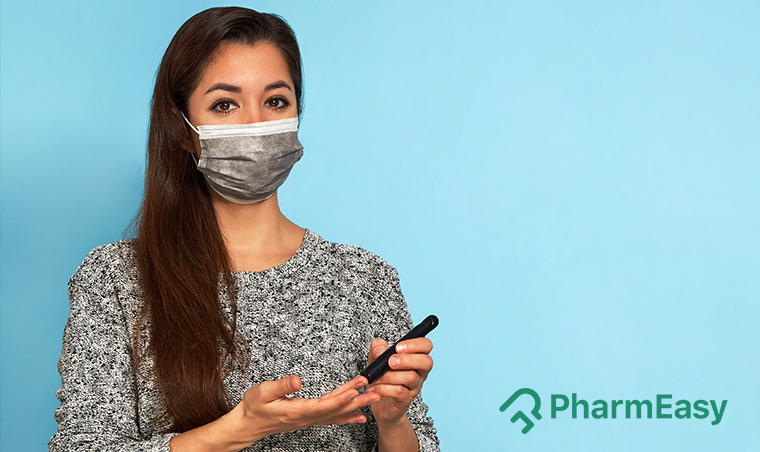Omicron: How Can Diabetics Protect Themselves?
By Dr. Nikita Toshi +2 more

Get,

to manage your symptom
Get your,


4 Cr+ families
benefitted

OTP sent to 9988776655



You’ve successfully subscribed to receive
doctor-approved tips on
Whatsapp

Get ready to feel your best.

Hi There,
Download the PharmEasy App now!!


Register to Avail the Offer
Send OTPBy continuing, you agree with our Privacy Policy and Terms and Conditions

Hi There,
Sign up on PharmEasy now!!
Trusted by 4 crore+ families

OTP sent to 9988776655



You have unlocked 25% off on medicines




Code: NU25
By Dr. Nikita Toshi +2 more
Table of Contents
Amidst the ambiguity regarding the latest Omicron variant of COVID-19, there may be several myths and rumors. Instead of worrying about these, it is better to follow certain specific guidelines to keep yourself and your family safe. Especially if you are a person with Diabetes, you will need to consider some additional precautions.

COVID-19 appropriate behavior- Wear an N-95 mask with a good fit or double mask, avoid crowds, follow hand hygiene and respiratory etiquette. Satinise the frequently touched surfaces at home and handle anything that comes from outside with care.
To take the necessary precautions, you will need to have certain equipment and paraphernalia available at home.
If you haven’t consulted a doctor in the last couple of months, you should also take a follow-up consultation.
One may experience some or even none of the above-mentioned symptoms and still be Covid positive. There are people with no symtoms, mild symtoms and even severe symtoms.
Do not panic if you have all the aforementioned symptoms of Omicron. The first thing you need to do in such a situation is to be alert and decisive. You also need to prevent the infection from spreading to your family and loved ones. Here’s what you should do
COVID-19, Diabetes and corticosteroid usage were correlated with a high risk for an invasive fungal infection called Mucormycosis, detection at an early stage is very critical to avoid fatal complications.
Dr. Ashish Bajaj , M.B.B.S., M.D. in Clinical Pharmacology and Toxicology
If you experience a sudden fall in insulin levels (which can lead to a sudden increase in blood sugar levels), consult a doctor immediately. Some oral medicines for diabetes may not be well tolerated during severe illness. Your doctor can adjust the dosage of your ongoing diabetes medication and start insulin as well. The most important thing is to not panic because once you have recovered there are high chances that your doses of medication will be adjusted again and recently added insulin injections can be discontinued then.
Finally, one of the most important things to keep in mind is to maintain a healthy diet. It is advisable to consume small frequent meals throughout the day to keep your metabolism regular. You should eat food that is low in sugar and easy to digest. Hence, avoid eating too many fried foods and food that is extremely high in fibre. It is best to opt for fresh fruits, a balanced salad, sprouts or even easy to digest food like Upma and Idli.
For breakfast, you can have oatmeal or daliya, while for lunch you can go for fresh green vegetables, paneer, soybeans, dal, etc. For dinner, you can have light soup and some vegetables, whole wheat flatbreads like roti/chapati, khichdi. Moreover, you should also drink enough water to keep your electrolyte levels steady.
There is currently not enough data to suggest the same. However, having diabetes can increase the chance of an Omicron infection becoming severe.
There is not enough data to show the difference, but people with either kind of diabetes have been suggested to have a higher risk of complications in the case of Omicron infection.
DKA can happen to people with persistent uncontrolled high blood sugars ie above 300 mg/dL. Watch for symptoms like:
Fruity odour from breath
Pain in abdomen
Loss of/altered consciousness
Nausea/vomiting
Fatigue
Confusion
Immediately check for urine ketones and consult a doctor. DKA is a medical emergency and should be managed in a hospital.
No, there is no evidence that supports this.
Disclaimer: The information provided here is for educational/awareness purposes only and is not intended to be a substitute for medical treatment by a healthcare professional and should not be relied upon to diagnose or treat any medical condition. The reader should consult a registered medical practitioner to determine the appropriateness of the information and before consuming any medication. PharmEasy does not provide any guarantee or warranty (express or implied) regarding the accuracy, adequacy, completeness, legality, reliability or usefulness of the information; and disclaims any liability arising thereof.
Links and product recommendations in the information provided here are advertisements of third-party products available on the website. PharmEasy does not make any representation on the accuracy or suitability of such products/services. Advertisements do not influence the editorial decisions or content. The information in this blog is subject to change without notice. The authors and administrators reserve the right to modify, add, or remove content without notification. It is your responsibility to review this disclaimer regularly for any changes.

Leave your comment...
Comments